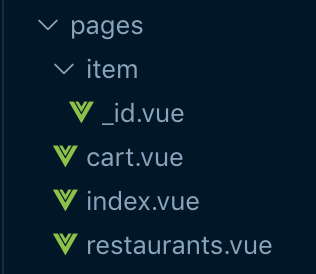As of v2.14.0 of Nuxt.js, you may notice a new configuration while setting up a new Nuxt project. When following the prompts, you’ll see a prompt for “Deployment Target”, and one of the options is “Static/Jamstack hosting”:

If you’re on an older project, you can set this manually by upgrading your version of Nuxt to ^2.14.0 in package.json and in nuxt.config.js, adding
target: 'static',You also must use universal rendering mode:
mode: 'universal',What does this do? The most amazing feature is that you no longer have to declare dynamic routes and create functions for their creation, it will automatically create them for you!
When creating dynamic pages in Nuxt, you’ll create a directory with an underscore of the unique identifier you’ll be using to associate the page, I typically use an id. So my pages directory would look like this:

And then I use this.$route.params.id to gather the unique id of the item and then create a computed property to filter my dataset for the rest of the object values.
Previously, I would have to then tell my nuxt.config.js file to gather all of the ids from the dataset and create pages from them using the generate.routes option. Here’s an example:
import data from './static/storedata.json'let dynamicRoutes = () => { return new Promise(resolve => { resolve(data.map(el => `product/${el.id}`)) })}
export default { ... generate: { routes: dynamicRoutes },}Now none of this configuration in nuxt.config.js necessary! Declare that your target is static and Nuxt takes care of the rest! 🎉 You no longer need HTTP calls to your API on client-side navigation. This process preloads the content and reduces the HTML size served for optimal performance.
If you want to exclude routes, you can use the generate.exclude option. You can also keep using generate.routes to add extra routes if you have a special configuration.
You can deploy straightaway from this repo or the button below:
Now you can prebuild all of your dynamic routes with excellent performance for your end user.






